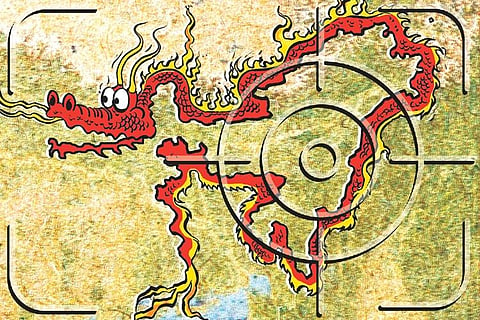

It doesn’t take much for us to forget a tragedy. See the news that the media and the government kept us engaged with in the past few weeks. A conflict in distant Israel hogged the headlines for a few days. Then it was the frenzy of cricket. Unless we are living the tragedy, what happens to other people is just breaking news headlines to be forgotten when the next breaking news comes. In all the cacophony of distraction, we have been blissfully unaware of the ongoing tragedy in one corner of our country.
The Indigenous Tribal Leaders Forum (ITLF) that represents Kuki-Zo people in Manipur has declared that if their demands are not met within two weeks, they will announce self-government in two districts. In other words, these groups have announced that these districts will break away from the state. The Meitei versus Kuki conflict there had been brewing for years, amid an uneasy peace. A high court directive to include Meiteis in the Scheduled Tribe list destroyed it.
There are laws that are discriminatory against Meiteis, who dominate the state government. The presence of poppy cultivation and a cross-border drug trade with drug cartels in Myanmar in some of the Kuki-dominated areas added to the complexity of the situation. Kukis have been demanding a separate state or at least an autonomous region for decades. So when the fighting broke out, it should not have come as
a surprise to anyone. Yet, the state and central government were caught unawares. It seems they are still thinking that by ignoring the situation, the problem will vanish by itself.
Meities have acquired arms by looting the Manipur police stations and Manipur Armed Forces armouries. Some reports allege it was not looting but a covert handover of weapons by the police to their ethnic brethren. On the other side, the Kuki-Zo groups have arms smuggled in from across the Myanmar border. At least 10,000 automatic weapons, countless rocket launchers and lakhs of rounds of ammunition is in the hands of militias on either side.
If the reports are true, what we have seen so far has been just a trailer. Both sides, now armed to teeth, are gearing up for a long civil war. They are brazenly displaying their weapons and giving war calls to each other. The division between the communities is complete. What is baffling is the silence in the media and political circles. If the same level of conflict had taken place in Kashmir, one can imagine the shrill narrative in the mainstream media.
How would the government have reacted? Without doubt, the Union government would have used all its might. In Kashmir, even during the peak of insurgency, the public support, at least overtly was limited. The terrorists fighting the Indian state were infiltrators paid and trained by Pakistan and a couple of thousand local youth who got carried away. In Manipur, it seems the entire population is itching to fight each other, giving scant respect to the prestige and power of the Indian government.
The tragedy of Manipur is that the rest of the country has moved on. Neither the government nor the media or opposition is bothered about this forgotten corner of the country. Manipur is still one of the biggest internal security threats of our time. The news in Gaza gets more eyeballs and advertisement revenue than Manipur. So why bother covering the civil war in the state and forcing the government to act?
A country often breaks apart at its seams. Whether it is Kashmir or the North-East, fissiparous forces threaten the unity and integrity of India. Kashmir occupies our mind space much more than any other zone of conflict due to historical reasons. Right from the eve of Independence, Pakistan has been perceived as our eternal enemy and this has served the interest of politicians on either side of the border. While it would be foolish to ignore the threat possessed by a nuclear Pakistan and its quest to make Kashmir into a global Islamic issue, the ongoing economic and political crisis in Pakistan has given us some respite. This, combined with the annulment of Article 370 and division of Jammu and Kashmir, has led to a slow return of peace in Kashmir. It was the decisive action of the Union government that brought back normalcy to Kashmir after almost seven decades of strife.
However, in the North East, things are going from bad to worse after a respite that graced the last decade. One cannot rule out the hands of our big neighbour China in the sudden re-emergence of insurgency in the North-East. Across the border, Myanmar is disintegrating and the repercussions are sure to cross the borders to our side too. While, in the long run, China could be a friend of India like it had been for centuries, the short term is not going to be rosy. The rise of two global superpowers that share such long borders and the world’s busiest ocean is not going to be smooth until India achieves parity with China in terms of economic and military might, which may take a few decades. Until then, it would be prudent to shift our focus from Pakistan to our eastern borders.
It is imperative that the Manipur issue be addressed before it is too late. The government should show the same decisiveness and determination it showed in Kashmir. If the division of the state on ethnic lines is a solution that would bring peace, the option should not be closed. The oft-neglected North-East of India may hold the key to the country’s future. We are ignoring it at our peril.
Anand Neelakantan
Author of Asura, Ajaya series, Vanara and Bahubali trilogy
mail@asura.co.in